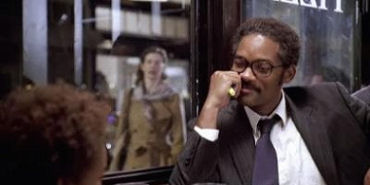As noted earlier, friends who’ve seen The Pursuit of Happyness (Columbia, 12.15) have told me that Will Smith‘s performance as Chris Gardner, a onetime homeless guy who worked hard and became a successful businessman, is seriously touching and Oscar-worthy, and that the Best Actor race will most likely come down to Smith vs. Peter O’Toole in Venus. They’re probably right.

But I can’t help but feel a certain amusement over David Poland and N.Y. Times reporter Sharon Waxman having seen Gabriele Muccino‘s The Pursuit of Happyness (Columbia, 12.15), and gone right back to their desks and written almost the same massage-y love-sonnet piece.
They’re about how making Pursuit led Smith to experience an emotional-creative blooming. Now, we’re being told, Smith doesn’t need people to love him as much as he did before, and that he’s found a new resolve — the strength of character to just be himself and get into the truth of things and come what may. (This may be true as far as his Happyness performance is concerned, but it’s almost certainly sprinkled with bullshit also. 38 year-old leopards obviously have the potential to mellow and grow, but they don’t change their spots.)
Smith’s partner James Lassiter tells Waxman that “Will has always been the guy who wanted people to love him, and he works hard at that. I think he’s starting to understand he doesn’t have to work as hard at that. That happens naturally.” Lassiter adds that making Happyness is part of the new deal, or vice versa. “In the past, ‘safe’ made more sense for us. But Will is now comfortable enough to say: `I relate to this [Chris Gardner’s] passion. I want to go with that.'”

Poland and Waxman are basically telling us that Smith has seemingly morphed into a deeper kind of cat. (Poland: “Something has happened to Will Smith.” Waxman: “For the last several years Mr. Smith, having achieved every other goal he had set in his life, has been, as he put it, ‘struggling to hit my stride as an artist.'”) He’s pushing 40, after all, and starting to settle into himself in a way that he couldn’t manage when he was younger.
This means in effect (or by implication), that he’s no longer the same smiling, charming, fun-attitude guy who made The Wild Wild West, Bad Boys II, Indepen- dence Day, Hitch, I, Robot and The Legend of Bagger Vance (i.e., “bag of gas”), and is now shooting the sci-fi actioner I Am Legend.
Why does this Smith-has-changed rap sound like the kind of thing a guy tells a girl on a first date so he can maybe get laid?
Indications are that Happyness, a true-life uplift story about how Gardner and his son were forced to sleep in public bathrooms and offices while he was working as a a trainee for a San Francisco office of Dean-Witter, is in fact a departure for Smith. But I think this is due more to Muccino’s directing influence and less to any presumed deepening of Smith’s creative soul.
Two lines have sold me on this: (a) Muccino’s pitch to Smith when they met in Paris (passed along by Poland) that even if he didn’t get to make it, the movie “had to be made by a non-American because ‘Americans have forgotten how to appreciate the American Dream”; and (b) Muccino calling Smith’s bluff during shooting (passed along by Waxman) when he complained at one point that “you’re posing…don’t you pose for my camera. You can’t trick me. You’re making faces as if you’re hurt. I need you to take some time. And come back. And be hurt.'”

Obviously if people buy this transformation story they might be more inclined to nominate Smith for a Best Actor Oscar. Columbia marketers obviously don’t want him to get passed for a Best Actor nomination or, if he makes it, lose the trophy to someone else, which is what happened when Smith’s superb performance in Ali lost to Denzel Washgton‘s in Training Day. We’re lookiing at a serious, big-push, do-or-die effort here.
The expected success of the Smith campaign means that Columbia will at least have something in Oscar play by the end of December now that three of their big fall-holiday guns — Marie Antoinette, Running With Scissors, All The King’s Men — have pretty much tanked and are way, way off the Oscar hopeful list. There’s also an emerging consensus that Stranger Than Fiction hasn’t a prayer of Oscar candi- dacy either, and it will probably also sink beneath the waves once audiences realize what a messy and unsatisfying concoction it is.
Poland and Waxman have obviously given Columbia publicists what they want in exchange for the privelege of being shown The Pursuit of Happyness early. No one’s saying it isn’t a touching little film and I’m not hearing that Smith’s Gardner portrayal isn’t as good as everyone’s saying. But the similarities between Poland and Waxman’s pieces are, if nothing else, striking.
The “sell” is sincere and truthful, but it’s a carefully strategized, well-coordinated effort nonetheless.









